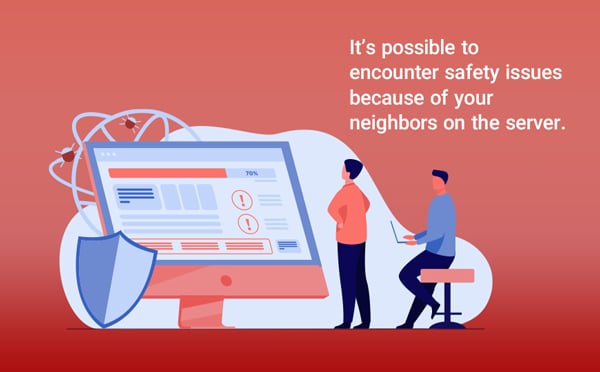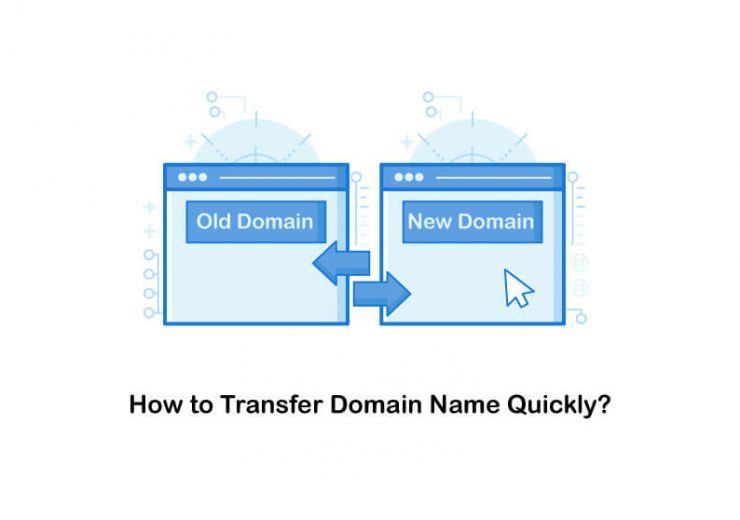What Is Shared Hosting Definition, Advantages and Disadvantages?

Deciding on the hosting service for a website can be really tough. Hosting service providers offer different packages and plans, and it can leave you in confusion about which one to choose. To hit the right note, you should gain information about different types of hosting plans and pick the correct one based on your needs.
Here we discuss what is shared hosting that comes as a popular choice for many users launching their first website. In the next paragraphs, we will break down the traits of this hosting service and define what kind of users can benefit from it.
What Is Shared Hosting?
Shared hosting plans are the most affordable option to use for running a website. As the name suggests, multiple sites share a single server when they run on shared hosting. That’s the reason why these services come at a lower price compared to the dedicated ones.
In most cases, the user doesn’t know other users by whom he’s sharing the server. But, all users have access to the platform of the server to see the databases, find out about email accounts, and access other provided features. The allowed capacities are limited by the service provider, which is often described in the details of the package you buy.

Generally speaking, a shared hosting server is proper for a personal web blog , startups, local businesses, or other small websites that don’t need very high bandwidth or professional settings. Websites with high volume should go for VPS or other dedicated options available on the market. Owners of these sites can take advantage of more in-depth controls and more stable performance if they choose plans with higher prices than the shared hosting. In the past article, we have mentioned the advantages of shared hosting .
How Does Shared Hosting Work?
Shared hosting plans are cheap and affordable. Before you go ahead with it, you will come across the need to figure out what is shared hosting and how it works. Shared hosting is where you will be provided with hosting space in a server, which hosts multiple other websites. It can even contain hundreds or thousands of websites. The server resources, including processing speed, RAM, and hard drive space is shared in between all the websites hosted. Due to the same reason, the performance of your website hosted on the shared hosting server can be affected by the performance of another website on the same server. This is something that you will need to be mindful of.
If you are interested to know application server versus web server differences, don’t miss this post!
Why Should You Buy a Shared Hosting Server?
There are different advantages associated with a shared hosting plan. The most key benefits are as follows:
1. No Need for Other People

Shared hosting is a self-manageable plan that doesn’t need in-depth technical knowledge to set up. These plans are often equipped with a simple control panel that allows website managers to access the options they need for their site.
They usually have a default cPanel or Fantastico that is easily controllable. So if you’re not very much into server configurations and want to put all of your focus on your business, shared hosting plans are the best you can find.
2. Perfect for Budget-Conscious UsersObviously, the service provider distributes the costs of the server between users in this plan.

when it comes to comparing Shared hosting and cloud hosting, dedicated server, and VPS, you can buy a shared hosting server at a more reasonable price. The pricing plans you find for these services fall somewhere between $2.5 to $10 per month.
Shared hosting plans are highly affordable, and many service providers include other perks, such as a free domain in their packages, too.
3. Flexible and UpgradableIf you, just like many other beginners, are not sure of the traffic your website has in a month, it’s better to start with shared hosting and then migrate to other survives if needed.
Many service providers have this strategy in mind and offer multiple levels of hosting that are upgradable over time. Therefore, as your business grows, you will have no worries about upgrades and data migration since all is possible for you without much hassle.

You can find many websites nowadays that have been using the same service provider for so many years and upgraded to better plans after a while. Moreover, shared hosting is an appropriate choice for hosting more than one domain. Some people have multiple domains for their portfolio, personal blog, business website, etc. You can connect your domains to your directory and manage them all in one place.
Who Should Buy a Shared Hosting Server?

Overall, for those who are starting a website from the ground up, there is no alternative to shared hosting. It’s by far the best choice for this group of users. Also, shared hosting is the right fit for those who can’t invest much in their hosting and need to keep their costs down. Beginner users with little experience regarding website management who choose Joomla and WordPress cms as their CMS could also benefit from this service extensively. Furthermore, in the beginning, it’s hard to predict how much space and requirements a website needs precisely. To this end, shared hosting is a proper flexible solution that allows you to manage the unknowns easier.
suggest you read our article about shared hosting vs cloud hosting
What Are the Advantages of Shared Hosting?
Now you have answers to the question of what is shared hosting. There are numerous benefits that you can get out of a shared hosting plan. Here are some of the key benefits that you can expect to receive at the end of the day.
1- You Can Host Multiple Domains
It is possible for you to have multiple domains under the user directory while using a shared hosting plan. The hosting provider will deliver a convenient interface, which you can use to manage all the websites as well. This interface can help you to overcome complexity in managing multiple websites.
2- It’s Professionally Managed
The maintenance cost associated with shared hosting is low. In fact, you will be able to professionally manage the website as well. All you have to do is to seek the assistance of a professional team and hand over the job to them.
3- It Can Host Dynamic Websites
Dynamic websites are the websites that change dynamically based on the way how a user is browsing is. Quora, Facebook, and Twitter are perfect examples of such dynamic websites. They are usually based on content management systems. You can easily host a dynamic website within your shared hosting plan.
What Are the Disadvantages of Shared Hosting?
Aside from the benefits of shared hosting, there are limitations associated with it as well.
Considering that the resources are shared in this service, you may experience slow load time compared to other hosting options.
The lousy performance or threats of other websites on the server may leave negative impacts on yours. It’s possible to encounter safety issues because of your neighbors on the server.
You don’t have access to many customizations, and the company controls many settings by default.
You should not expect the service to handle high traffic easily. If your website grows dramatically, you may experience multiple downtimes.

Things To Consider When Choosing a Shared Hosting Plan
Upon understanding what is shared hosting and the benefits of shared web hosting, you will need to explore the factors that can contribute towards the best results out of your shared hosting plan. Here are some important tips that you need to consider as you try to obtain your shared hosting plan.
1- Uptime
One of the very first things you should do as of now is to take a look at the uptime. If the shared hosting plan is leading you to continuous downtimes, you will end up with struggles. This is why you should be mindful of the uptime. You can then make your website available for visitors at all times.
2- Speed
Next, you should be mindful of safety. No person would like to wait for more than 3 seconds for a page of your website to load. While keeping this in mind, you should pay extra attention to the speed of the website.
3- Security
Shared hosting can be risky as your server will be shared with numerous other entities. This is why you should be mindful of the security of the website. Then you will be able to keep it away from threats.
4- Resources
There should be enough resources available for you to host the website. This is something that you should double-check and see. If not, you will run into struggles because of a lack of resources.
5- Easy to use dashboard
You never expect to go through any struggles when using the web hosting account. This is why you should check and see whether there is an easy-to-use dashboard is available or not.
6- Support
Last but not least, you need to make sure that proper support is available to you. Then you can get answers to all the questions you have promptly.
1) What Is the Purpose of Shared Hosting?
If you are wondering what does shared hosting mean, we should say that it is a kind of web hosting capable of hosting multiple websites on a single server. In this way, several websites can host their website files and utilize the resources together. As a result, the cost for shared hosting plans is much more reasonable than the other kinds of plans.
2) Is Shared Hosting Slow?
One of the most important shared hosting drawbacks is its speed. The performance of your website highly depends on the activity of other websites which are hosted on the same plan and also by the server infrastructure itself.
3) How Much Traffic Can a Shared Hosting Handle?
Good shared hosting is capable of handling about 1.5–2k traffic per hour. It actually depends on how website owners optimize their website pages. With the average size of 700kb to 1.3 MB of website pages, we can say that shared hosting can handle 7–12 k daily traffic without any problem. But for more traffic, users may experience some slow loading issues. For more information click here .




